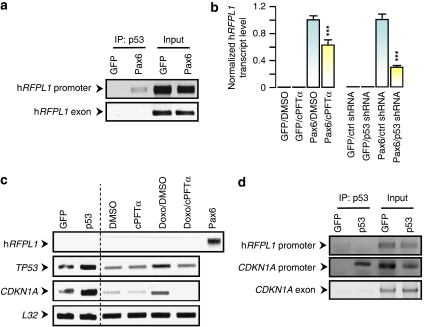Figure 1.
p53 functions as an enhancer of Pax6-elicited hRFPL1 expression. (a) In vivo binding of p53 to hRFPL1 promoter was assessed by chromatin immunoprecipitation assay following induction of hRFPL1 expression by Pax6. After p53 immunoprecipitation, end-point PCRs were performed with specific primers for hRFPL1 promoter or exon 2 to control nonspecific immunoprecipitation. Input: dilution of input chromatin used as PCR controls. (b) Inhibition of p53 using Cyclic Pifithrin-α (cPFTα) or p53 shRNA decreases the Pax6-elicited hRFPL1 expression in HeLa cells as measured by quantitative PCR. ***P<0.001 compared with Pax6 control groups using two-way ANOVA followed by Tukey's post hoc test. (c) Assessment of hRFPL1 and CDKN1A, a p53 target encoding p21WAF1/CIP1, transcript levels by semiquantitative end-point PCR following p53 overexpression using a CMV-TP53 sequence containing pcDNA vector or doxorubicin. Use of the p53 inhibitor, Cyclic Pifithrin-α (cPFTα), serves to control that these observations result from the impact of doxorubicin on p53 regulation. (d) Assessment of p53 in vivo binding to hRFPL1 and CDKN1A promoters independently of Pax6 signaling was assessed by chromatin immunoprecipitation assay following p53 overexpression. End-point PCRs were performed similarly to (a)

